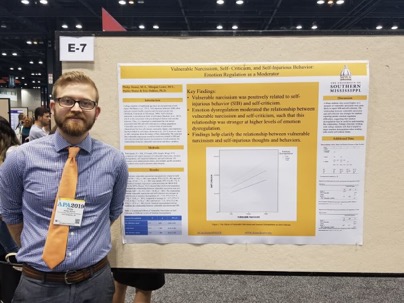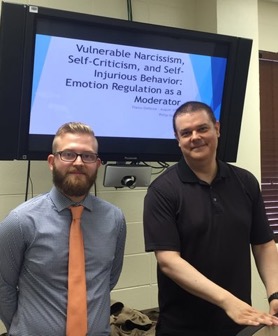
Director: Eric R. Dahlen, Ph.D.
narcissism
Philip Stoner Defends Dissertation
02/11/22 Personality
Philip Stoner, an advanced doctoral student currently completing his predoctoral internship at the Federal Correctional Complex in Petersburg, VA, successfully defended his dissertation today. Philip’s study utilized structural equation modeling to test key components of Hooley and Franklin’s (2018) benefits and barriers model for non-suicidal self-injury (NSSI). Using a sample of college women, he found that adverse childhood experiences predicted NSSI and that this relationship was partially mediated by self-esteem, peer-bonding motivation, and shame. Philip followed this analysis with invariance testing to examine the moderating influence of both grandiose and vulnerable narcissism. His findings have many interesting implications that should be helpful for mental health professionals working with college students.
Congratulations to Philip on a very impressive defense!
Congratulations to Philip on a very impressive defense!
Philip Stoner Proposes Dissertation
05/06/20 Personality

Of particular relevance to our work in the lab and building on his prior thesis work, Philip plans to incorporate grandiose and vulnerable narcissism as potential moderators of some of the expected relationships he will be testing between theoretically relevant predictors and NSSI.
Much like Ali’s recent thesis defense, Philip’s dissertation proposal took place online through Microsoft Teams. Everything worked as intended, and one would never had guessed that he hadn’t presented like this before.
Congratulations to Philip on the successful proposal!
Lab Represented at APA
08/12/19 About

Philip’s poster was based on his master’s thesis and described his finding that emotion regulation moderated the relationship between vulnerable narcissism and self-criticism. Hailee’s poster, which also utilized data collected as part of Philip’s thesis project but not used in his thesis, described her finding that anxiety moderated the relationship between peer exclusivity and relational aggression among college students.
Hailee is completing her honor’s thesis in the lab, and this was her first professional conference. She received a Discovery Scholar Research Grant from the Honors College at the University of Southern Mississippi, which supported her travel to Chicago.
Congratulations on a successful conference!
Philip Stoner Defends Thesis
08/23/18 Personality

He found that vulnerable narcissism was positively related to both self-injury and self-criticism and that difficulties in emotion regulation moderated the relationship between vulnerable narcissism and self-criticism. Specifically, the relationship between vulnerable narcissism and self-criticism was stronger at higher levels of emotion dysregulation. Although some of Philip’s results were unexpected and may lead us to carry out additional analyses on his data, his thesis should be useful in informing the development of his dissertation. For his dissertation, Philip has expressed interest in studying the constellation of personality traits referred to as the Vulnerable Dark Triad (i.e., borderline personality, vulnerable narcissism, and secondary psychopathy).
What is the Dark Triad?
11/12/17 Personality
We are simultaneously drawn to and repelled by sensationalized stories of serial killers and mass murderers, seeking to understand how one of our fellow humans could commit such atrocities against innocent victims. Are these offenders vastly different from us in their genes, early environment, and/or recent life stressors, or are we all capable of such cruelty under the right set of circumstances? We wonder about what dark aspects of the human personality might be involved in such horrific acts. The question of why people violate social norms, commit moral transgressions (e.g., deceit, manipulation), and inflict harm on others has long intrigued psychologists and the public alike.
The Dark Triad refers to three overlapping but distinct personality traits associated with a variety of antisocial and morally transgressive behaviors: psychopathy, narcissism, and Machiavelianism (Paulhus & Williams, 2002). Considered together, these traits involve emotional coldness, a lack of empathy, the desire for personal advancement at the expense of healthy relationships, grandiosity, and a willingness to manipulate others (Jonason, Lyons, Bethell, & Ross, 2013). Although there are well-known clinical manifestations of psychopathy and narcissism, work on the Dark Triad has emphasized the goal of understanding the subclinical forms of these traits found throughout the population (Furnham, Richards, & Paulhus, 2013). That is, most of the Dark Triad research seeks to understand the dark personalities we encounter in our daily lives.
Psychopathy
Psychopathy describes a specific constellation of affective, interpersonal, lifestyle, and behavioral characteristics. These include impulsivity; callous affect; poor reliability in performing various roles; a lack of remorse, empathy, or guilt; and a tendency toward rule violation (Hare, 2003; Jones & Paulhus, 2014). Although psychopathy is associated with criminality and violence (Hare & Neumann, 2009) and is considered to be the most dangerous of the Dark Triad traits, its utility is not restricted to criminal and forensic contexts. For example, subclinical psychopathy predicts a variety of behaviors that are not necessarily criminal (e.g., academic dishonesty, relational aggression, cyber aggression, substance misuse) but still likely to be of interest (Kokkinos, Antoniadou, & Markos, 2014; Williams, Paulhus, & Hare, 2007).
Narcissism
Much like the clinical version (i.e., Narcissistic Personality Disorder), subclinical narcissism involves grandiosity, as well as entitlement and a sense of superiority; however, this grandiose narcissism is only one part of the construct. Another important aspect involves narcissistic vulnerability, which refers to a vulnerable self-concept and efforts at self-enhancement (Morf & Rodenwalt, 2001). While grandiose narcissism tends to be emphasized in much of the Dark Triad literature, vulnerable narcissism appears to be relevant in many areas of emotional and interpersonal functioning. Subclinical narcissism has been linked to aggression (Bushman & Baumeister, 1998), online antisocial behavior (Carpenter, 2012), and a number of other variables of interest.
Machiavellianism
Machiavellianism is probably the least understood of the Dark Triad traits. It refers to a manipulative interpersonal style named for Niccolò Machiavelli (Christie & Geis, 1970). In The Prince (1513), Machiavelli described several behaviors most of us would regard as immoral (e.g., lying, deceit, and even murder) as effective strategies for a ruler to maintain power. Machiavellianism is perhaps best characterized as the perspective that the ends justify the means. People high in Machiavellian traits are described as cynical on morality, focused on personal gain, and willing to manipulate and exploit others to achieve their goals (Jones & Paulhus, 2009). Machiavellian personality traits have been linked to online relational aggression (Abell & Brewer, 2014) and a number of other antisocial behaviors.
At the Anger and Traffic Psychology Lab, our primary interest with regard to the Dark Triad traits involves their role in nonclinical populations (i.e., individuals in the community who are not currently receiving treatment for diagnosed personality disorders or other mental health problems) of emerging adults. That is, we are interested in how individual differences in scores on subclinical measures of Dark Triad traits relate to a variety of socially undesirable behaviors (e.g., overt and relational aggression, cyber aggression, dysfunctional anger expression, jealousy, academic dishonesty, aggressive driving) among young adults.
References
Abell, L., & Brewer, G. (2014). Machiavellianism, self-monitoring, self-promotion and relational aggression on Facebook. Computers in Human Behavior, 36, 258-262.
Bushman, B. J. & Baumeister, R. F. (1998). Threatened egotism, narcissism, self-esteem, and direct and displaced aggression: Does self-love or self-hate lead to violence? Journal of Personality and Social Psychology, 75, 219-229.
Carpenter, C. J. (2012). Narcissism on Facebook: Self-promotional and anti-social behavior. Personality and Individual Differences, 52, 482-486.
Christie R. & Geis F. L. (1970). Studies in Machiavellianism. New York: Academic Press.
Furnham, A., Richards, S. C., & Paulhus, D. L. (2013). The dark triad of personality: A 10 year review. Social and Personality Compass, 7, 199-216.
Hare, R. D. (2003). Manual for the Revised Psychopathy Checklist (2nd Edition). Toronto, ON, Canada: Multi-Health Systems.
Hare, R. D., & Neumann, C. S. (2009). Psychopathy: Assessment and forensic implications. The Canadian Journal of Psychiatry, 54, 791-802.
Jonason, P. K., Lyons, M., Bethell, E. J., & Ross, R. (2013). Different routes to limited empathy in the sexes: Examining the links between the Dark Triad and empathy. Personality and Individual Differences, 54, 572-576.
Jones, D. N., & Paulhus, D. L. (2014). Introducing the Short Dark Triad (SD3): A brief measure of dark personality traits. Assessment, 21, 28-41.
Jones, D.N., & Paulhus, D. L. (2009). Machiavellianism. In M.R. Leary & R.H. Hoyle (Eds.), Handbook of individual differences in social behavior. New York: Guilford.
Kokkinos, C. M., Antoniadou, N., & Markos, A. (2014). Cyber-bullying: An investigation of the psychological profile of university student participants. Journal of Applied Developmental Psychology, 35, 204-214.
Morf, C. C. & Rhodewalt, F. (2001). Unraveling the paradoxes of narcissism: a dynamic self-regulatory processing model. Psychological Inquiry, 12, 4, 177-196.
Paulhus, D. L., & Williams, K. (2002). The Dark Triad of personality: Narcissism, Machiavellianism, and psychopathy. Journal of Research in Personality, 36, 556-568.
Williams, K. M., Paulhus, D. L. & Hare, R. D. (2007). Capturing the four-factor structure of psychopathy in college students via self-report. Journal of Personality Assessment, 88, 205-219.
The Dark Triad refers to three overlapping but distinct personality traits associated with a variety of antisocial and morally transgressive behaviors: psychopathy, narcissism, and Machiavelianism (Paulhus & Williams, 2002). Considered together, these traits involve emotional coldness, a lack of empathy, the desire for personal advancement at the expense of healthy relationships, grandiosity, and a willingness to manipulate others (Jonason, Lyons, Bethell, & Ross, 2013). Although there are well-known clinical manifestations of psychopathy and narcissism, work on the Dark Triad has emphasized the goal of understanding the subclinical forms of these traits found throughout the population (Furnham, Richards, & Paulhus, 2013). That is, most of the Dark Triad research seeks to understand the dark personalities we encounter in our daily lives.
Psychopathy
Psychopathy describes a specific constellation of affective, interpersonal, lifestyle, and behavioral characteristics. These include impulsivity; callous affect; poor reliability in performing various roles; a lack of remorse, empathy, or guilt; and a tendency toward rule violation (Hare, 2003; Jones & Paulhus, 2014). Although psychopathy is associated with criminality and violence (Hare & Neumann, 2009) and is considered to be the most dangerous of the Dark Triad traits, its utility is not restricted to criminal and forensic contexts. For example, subclinical psychopathy predicts a variety of behaviors that are not necessarily criminal (e.g., academic dishonesty, relational aggression, cyber aggression, substance misuse) but still likely to be of interest (Kokkinos, Antoniadou, & Markos, 2014; Williams, Paulhus, & Hare, 2007).
Narcissism
Much like the clinical version (i.e., Narcissistic Personality Disorder), subclinical narcissism involves grandiosity, as well as entitlement and a sense of superiority; however, this grandiose narcissism is only one part of the construct. Another important aspect involves narcissistic vulnerability, which refers to a vulnerable self-concept and efforts at self-enhancement (Morf & Rodenwalt, 2001). While grandiose narcissism tends to be emphasized in much of the Dark Triad literature, vulnerable narcissism appears to be relevant in many areas of emotional and interpersonal functioning. Subclinical narcissism has been linked to aggression (Bushman & Baumeister, 1998), online antisocial behavior (Carpenter, 2012), and a number of other variables of interest.
Machiavellianism
Machiavellianism is probably the least understood of the Dark Triad traits. It refers to a manipulative interpersonal style named for Niccolò Machiavelli (Christie & Geis, 1970). In The Prince (1513), Machiavelli described several behaviors most of us would regard as immoral (e.g., lying, deceit, and even murder) as effective strategies for a ruler to maintain power. Machiavellianism is perhaps best characterized as the perspective that the ends justify the means. People high in Machiavellian traits are described as cynical on morality, focused on personal gain, and willing to manipulate and exploit others to achieve their goals (Jones & Paulhus, 2009). Machiavellian personality traits have been linked to online relational aggression (Abell & Brewer, 2014) and a number of other antisocial behaviors.
At the Anger and Traffic Psychology Lab, our primary interest with regard to the Dark Triad traits involves their role in nonclinical populations (i.e., individuals in the community who are not currently receiving treatment for diagnosed personality disorders or other mental health problems) of emerging adults. That is, we are interested in how individual differences in scores on subclinical measures of Dark Triad traits relate to a variety of socially undesirable behaviors (e.g., overt and relational aggression, cyber aggression, dysfunctional anger expression, jealousy, academic dishonesty, aggressive driving) among young adults.
References
Abell, L., & Brewer, G. (2014). Machiavellianism, self-monitoring, self-promotion and relational aggression on Facebook. Computers in Human Behavior, 36, 258-262.
Bushman, B. J. & Baumeister, R. F. (1998). Threatened egotism, narcissism, self-esteem, and direct and displaced aggression: Does self-love or self-hate lead to violence? Journal of Personality and Social Psychology, 75, 219-229.
Carpenter, C. J. (2012). Narcissism on Facebook: Self-promotional and anti-social behavior. Personality and Individual Differences, 52, 482-486.
Christie R. & Geis F. L. (1970). Studies in Machiavellianism. New York: Academic Press.
Furnham, A., Richards, S. C., & Paulhus, D. L. (2013). The dark triad of personality: A 10 year review. Social and Personality Compass, 7, 199-216.
Hare, R. D. (2003). Manual for the Revised Psychopathy Checklist (2nd Edition). Toronto, ON, Canada: Multi-Health Systems.
Hare, R. D., & Neumann, C. S. (2009). Psychopathy: Assessment and forensic implications. The Canadian Journal of Psychiatry, 54, 791-802.
Jonason, P. K., Lyons, M., Bethell, E. J., & Ross, R. (2013). Different routes to limited empathy in the sexes: Examining the links between the Dark Triad and empathy. Personality and Individual Differences, 54, 572-576.
Jones, D. N., & Paulhus, D. L. (2014). Introducing the Short Dark Triad (SD3): A brief measure of dark personality traits. Assessment, 21, 28-41.
Jones, D.N., & Paulhus, D. L. (2009). Machiavellianism. In M.R. Leary & R.H. Hoyle (Eds.), Handbook of individual differences in social behavior. New York: Guilford.
Kokkinos, C. M., Antoniadou, N., & Markos, A. (2014). Cyber-bullying: An investigation of the psychological profile of university student participants. Journal of Applied Developmental Psychology, 35, 204-214.
Morf, C. C. & Rhodewalt, F. (2001). Unraveling the paradoxes of narcissism: a dynamic self-regulatory processing model. Psychological Inquiry, 12, 4, 177-196.
Paulhus, D. L., & Williams, K. (2002). The Dark Triad of personality: Narcissism, Machiavellianism, and psychopathy. Journal of Research in Personality, 36, 556-568.
Williams, K. M., Paulhus, D. L. & Hare, R. D. (2007). Capturing the four-factor structure of psychopathy in college students via self-report. Journal of Personality Assessment, 88, 205-219.
Philip Stoner Proposes Thesis
04/21/17 About
Philip Stoner, a first-year student in the Counseling Psychology doctoral program at the University of Southern Mississippi, successfully proposed his master’s thesis today. Philip’s thesis will examine the relationship of vulnerable narcissism and emotion dysregulation in self-injurious behavior and self-criticism.
Both vulnerable narcissism and emotion dysregulation have been linked to suicidality in previous studies; however, relatively little is known about the relationship of these factors to self-injurious behavior and self-criticism in non-clinical settings. Philip’s study will use a college student sample and is anticipated to generate some useful information about the important topic of college student mental health.
Congratulations to Philip on the successful proposal!
Both vulnerable narcissism and emotion dysregulation have been linked to suicidality in previous studies; however, relatively little is known about the relationship of these factors to self-injurious behavior and self-criticism in non-clinical settings. Philip’s study will use a college student sample and is anticipated to generate some useful information about the important topic of college student mental health.
Congratulations to Philip on the successful proposal!

